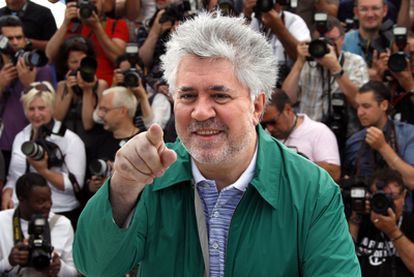"Directing is the nearest thing to being God"
Pedro Almodóvar on his new film 'The Skin I Live In' which premiered at Cannes
The international critics were almost united in their praise for Spanish director Pedro Almodóvar's dark new thriller The Skin I Live In after its unveiling at the Cannes Film Festival on Thursday morning. An extreme story about the revenge of a plastic surgeon (Antonio Banderas) and his relationship with his only client (Elena Anaya), it features genetic engineering, Brazil and terror, and marks Almodóvar's first foray into the horror genre.
"I read Tarantula, the novel on which the script is based, 10 years ago and I raced through it," the director explained in the post-screening press conference. "I was hooked by something that wasn't particularly well told in the book: the magnitude of that revenge. In one moment of the film we discover the family's Brazilian origin, because that allowed us to see it is a vicious family... and because the first plastic surgeons I met were from Brazil. I was attracted by the fact that its culture isn't based on punishment and sin. They are morally independent; they don't know guilt, like in the culture in which I grew up. Marisa Paredes' character has raised two violent children; it recognizes that they carry madness within them."
"I began in comedy, then melodrama... Now I've reached the thriller"
"I was tempted to shoot it in black and white - and as a silent movie"
Surrounded by journalists, Almodóvar surveyed the genres he has passed through. "I started off in pop comedy, moved through melodrama... Now I've reached the thriller, which today is the genre that unites the best opportunities to pass into other genres... because I break genre rules. Today you can't shoot a thriller with the innocence of the 1950s. In fact, looking for references, I thought more about horror, about Fritz Lang's first works, and for months I was tempted to make a film in his style; going even further, I was tempted to shoot it in black and white and silent."
The Skin I Live In features a deep reflection on creators and creations, about the giving and taking away of life. "A film director is the nearest thing there is to God, with a whole crew under his orders," Almodóvar continued. "Antonio's character is very close to being that creator because he suddenly makes an artificial skin. He is an extreme guy, psychopathic... I am not exactly like that..."
Almodóvar was also asked about his influences, from the obvious ones captured in the film to those that inspired him before shooting. "Above all I thought about [French director Georges Franju's 1960 film] Eyes Without a Face, a feature I know by heart. My brother [and producer Agustín] helped me with the transgenesis [aspect], research that has advanced a lot from the moment we began the script. However, bioethics has cut off the human branch of transgenesis advances, even though it has continued, for example, in plants. In this part I wanted to move away from gore, from spectacle, from blood, even though there are a lot of incisions in the film. Frankenstein? It's obvious that it's there, but the echoes of Greek myths such as Prometheus, the Titan who stole fire from the Gods to give it to humans, ended up resounding more. Here transgenesis is the fire of Prometheus, or the electricity with which Mary Shelley gave life in Frankenstein. Science is going to take us along roads and show us abysses we don't yet know; art will accompany us by our side on that journey."
Arriving in Cannes, Almodóvar left behind in Madrid the May 15 protest movement, led by demonstrators camped out in Puerta de Sol. "It seems very important to me, and demonstrates the enormous dissatisfaction of many Spaniards, including myself," he says. "Suddenly these elections are approaching and we don't know who to vote for. I know what I don't want to vote for, but I don't see what I want to vote for. That creates an enormous impotence and the politicians should take it personally. The slogan 'Democracy Now' seems adequate to express the feeling that they don't represent us. To the young, Spanish democracy has reached a moment to grow and change, and this is a big symptom. I am enormously glad about this peaceful and civic phenomenon, and I don't think it will disappear after the elections."











































